Dua Old and New - Asal Dua, Asal Ghat Pat Dua
You have posted above what looks like some minutes but without any place or date and out of context. Also post the subsequent report on Ali Allah made by Ismaili Association to correct the errors in the minutes which you have partially quoted. Send the whole papers properly scanned in pdf format to [email protected]
You have also posted few pages from the Dua book. Please send the full book's scan in PDF to the same email so we can replace the incomplete book above.
You have also posted few pages from the Dua book. Please send the full book's scan in PDF to the same email so we can replace the incomplete book above.
I don't recall stating such a meaning. Can you provide exact date and thread at which it was posted.swamidada wrote: Please refer to your one old post where you have given meaning of Aliyyullah as 'Ali is from Allah, how come!? Now you are somersaulting.
The institutions represent the zaher. But murids have adifferent understanding from the batini point of view. Else how could we recite Ginans and Qasidas filled with Ali Allah.
-
swamidada_1
- Posts: 239
- Joined: Sun Nov 18, 2018 9:21 pm
In a week or so I shall send you complete 1956 version Dua and its meaning.Admin wrote:You have posted above what looks like some minutes but without any place or date and out of context. Also post the subsequent report on Ali Allah made by Ismaili Association to correct the errors in the minutes which you have partially quoted. Send the whole papers properly scanned in pdf format to [email protected]
You have also posted few pages from the Dua book. Please send the full book's scan in PDF to the same email so we can replace the incomplete book above.
Regarding your other query let me quote the heading of minutes:
" Minutes of audience graciously granted by Sarkar Saheb Mowlana Hazar Imam to the office bearers of Ismailia Association Pakistan and Presidents and officers of Ismailia Associations for India, Kenya, Uganda, Tanganyika, Madagascar, and Brundi on 16th December 1964, at 7.05 p.m".
-
swamidada_1
- Posts: 239
- Joined: Sun Nov 18, 2018 9:21 pm
As I recall it was your post before 2010, some one asked you meaning of Aliyyullah which you quoted 'Ali is from Allah'. During discussion on this subject I quoted that reference in your wordings. Your reply to me was," I quoted that according to Dua meaning published by ITREB, but personally I believe in Ali Allah". It was there when I used the word somersault for you. I don't know still that posting exists or deleted. I shall try to find the thread and let you know if posting is still alive.kmaherali wrote:I don't recall stating such a meaning. Can you provide exact date and thread at which it was posted.swamidada wrote: Please refer to your one old post where you have given meaning of Aliyyullah as 'Ali is from Allah, how come!? Now you are somersaulting.
The institutions represent the zaher. But murids have adifferent understanding from the batini point of view. Else how could we recite Ginans and Qasidas filled with Ali Allah.
I have no memory of saying something like that! It should not be too difficult for you to find it since it was your post. Just search for the word somersault and Ali Allah.swamidada wrote: As I recall it was your post before 2010, some one asked you meaning of Aliyyullah which you quoted 'Ali is from Allah'. During discussion on this subject I quoted that reference in your wordings. Your reply to me was," I quoted that according to Dua meaning published by ITREB, but personally I believe in Ali Allah". It was there when I used the word somersault for you. I don't know still that posting exists or deleted. I shall try to find the thread and let you know if posting is still alive.
-
swamidada_1
- Posts: 239
- Joined: Sun Nov 18, 2018 9:21 pm
kmaherali wrote:I have no memory of saying something like that! It should not be too difficult for you to find it since it was your post. Just search for the word somersault and Ali Allah.swamidada wrote: As I recall it was your post before 2010, some one asked you meaning of Aliyyullah which you quoted 'Ali is from Allah'. During discussion on this subject I quoted that reference in your wordings. Your reply to me was," I quoted that according to Dua meaning published by ITREB, but personally I believe in Ali Allah". It was there when I used the word somersault for you. I don't know still that posting exists or deleted. I shall try to find the thread and let you know if posting is still alive.
Here is the proof, though prior to that post my reference was deleted;
kmaherali
Joined: 27 Mar 2003
Posts: 18717
PostPosted: 18 Jul 2016 09:03 pm Post subject: Reply with quote
shivaathervedi wrote:
Karim look what you have translated,
Alliyullah means, Ali the master of believers is from Allah.
Or,
I BEAR WITNESS THAT ALI , THE MASTER OF BELIEVERS IS FROM ALLAH.
This is what I have been saying and quoted 1964 farman of Hazar Imam, made at Karachi in which he said ALI IS FROM ALLAH.
Being an Ismaili we should have faith in KALIMAH E SHAHADAH.
Reply by kmaherali:
Thanks for pointing that out.I was just explaining what the Shahada was as a declaration of faith and I must have therefore copy pasted the translation, but if I have done so it is not my translation and I would like to correct it as ALI IS ALLAH.
As I said in the post, it is not my translation and I must have copy pasted it from another source.swamidada wrote: This is what I have been saying and quoted 1964 farman of Hazar Imam, made at Karachi in which he said ALI IS FROM ALLAH.
Being an Ismaili we should have faith in KALIMAH E SHAHADAH.
Reply by kmaherali:
Thanks for pointing that out.I was just explaining what the Shahada was as a declaration of faith and I must have therefore copy pasted the translation, but if I have done so it is not my translation and I would like to correct it as ALI IS ALLAH.
I don't recall a Farman made by the Imam saying that "Ali is from Allah". If he mentioned it in a zaheri context where there were non-Ismailis present, then it is a different matter. Imam always speaks according to context and audience.
-
swamidada_1
- Posts: 239
- Joined: Sun Nov 18, 2018 9:21 pm
Dua 1957 Lizikrihi Sujud
Posting complete version of 1956 new Dua with translation
Here is the PDF file. Version 1957 or later after Shah Karim became Imam.
http://ismaili.net/source/dua/dua1957sujud.pdf
[initial posting edited by Admin]
Here is the PDF file. Version 1957 or later after Shah Karim became Imam.
http://ismaili.net/source/dua/dua1957sujud.pdf
[initial posting edited by Admin]
Asal Dua and Asal Gat Pat Dua - cover pages of books
Here are some cover pages of the Asal Dua and Asal Gat Pat ji Dua (bottom page) attributed to Pir Sadardin (but probably recited since at least the time of Pir Shams.) - All these Duas in Gujrati and Khojki scripts and more will be made available once our Document Server will be ready and all scans catalogued and made searchable. [No estimated date so far, may take time)
Asal Dua printed in Khojki script (no date, missing cover)
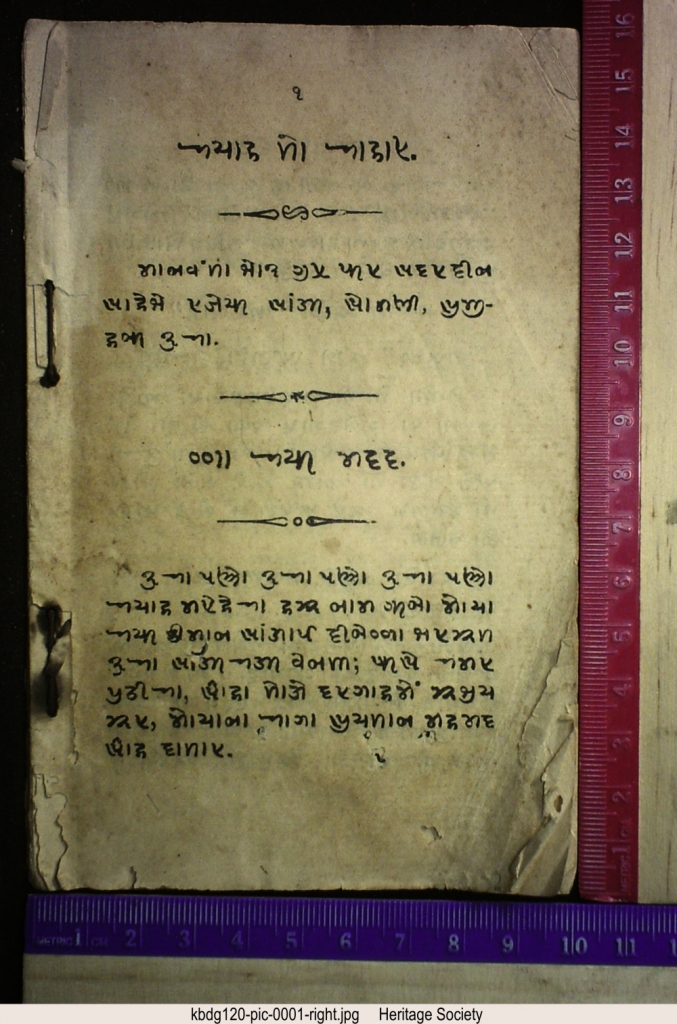
Asal Dua printed in Gujrati script in Mumbai in 1922 with meaning by Varteji missionary.
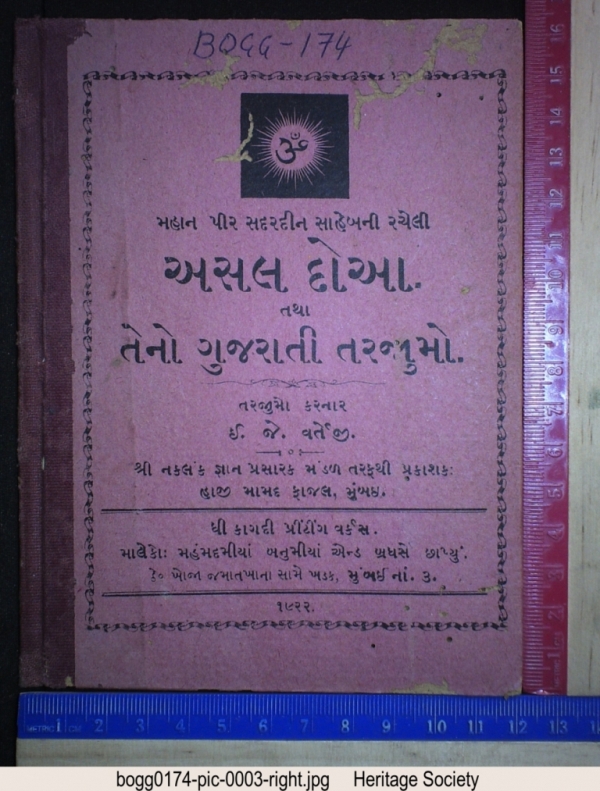
Asal Dua printed by The Recreation Club in Gujrati script in Mumbai in 1922 with meanings
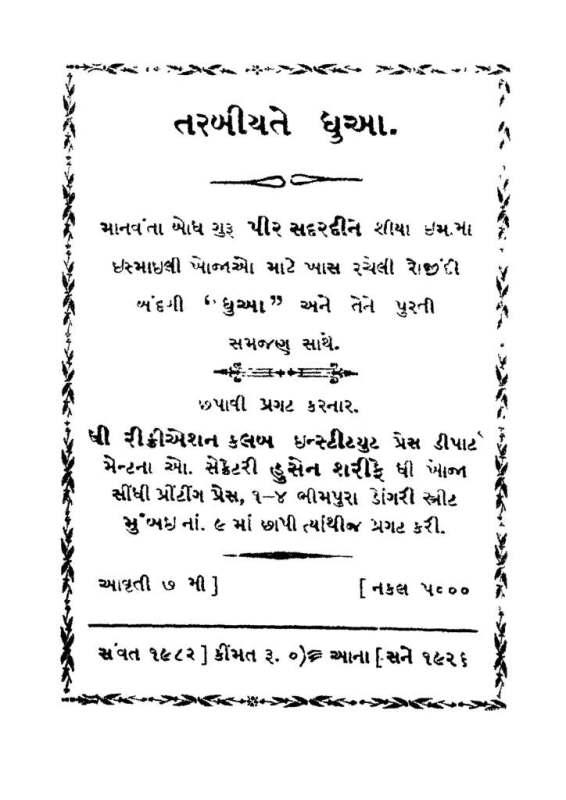
Asal Dua printed by The Recreation Club Institute in Gujrati script in Mumbai in 1928
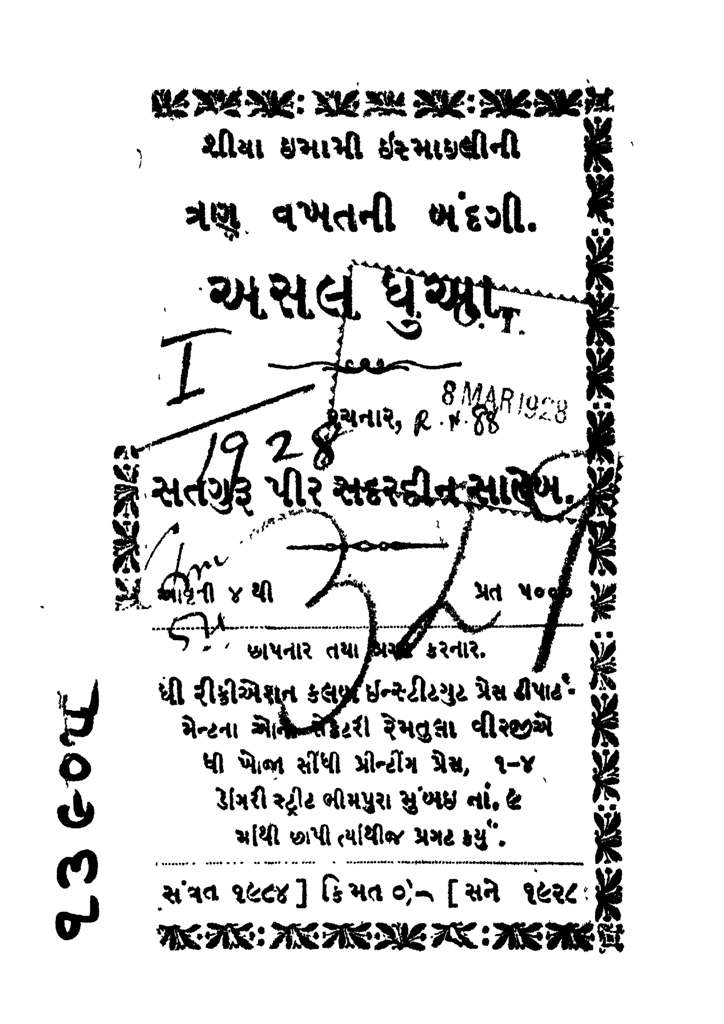
Asal Dua (10th edition, 5,000 copies printed) in Gujrati script in Mumbai in 1946
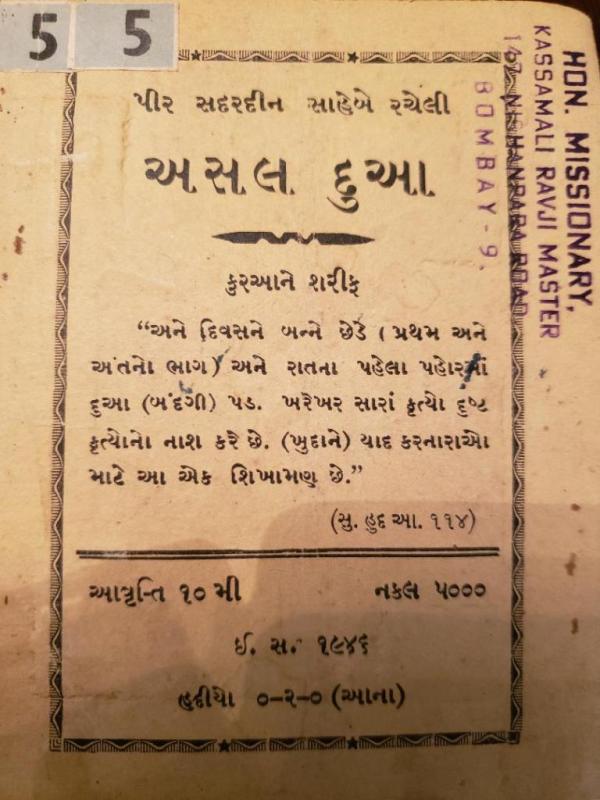
Here below are some cover pages of the Asal Gat Pat Dua
Asal Gat Pat ji Dua in Gujrati script in Mumbai in 1951 by The Ismailia Association
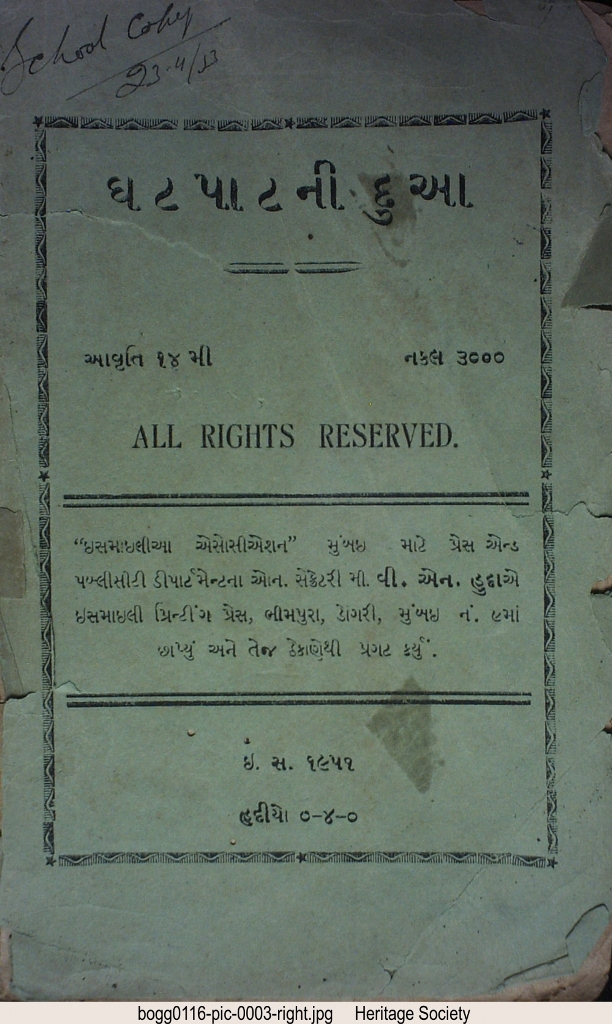
Asal Gat Pat ji Dua in Khojki script By Mukhi Lalji Bhai Devraj in Mumbai in 1911
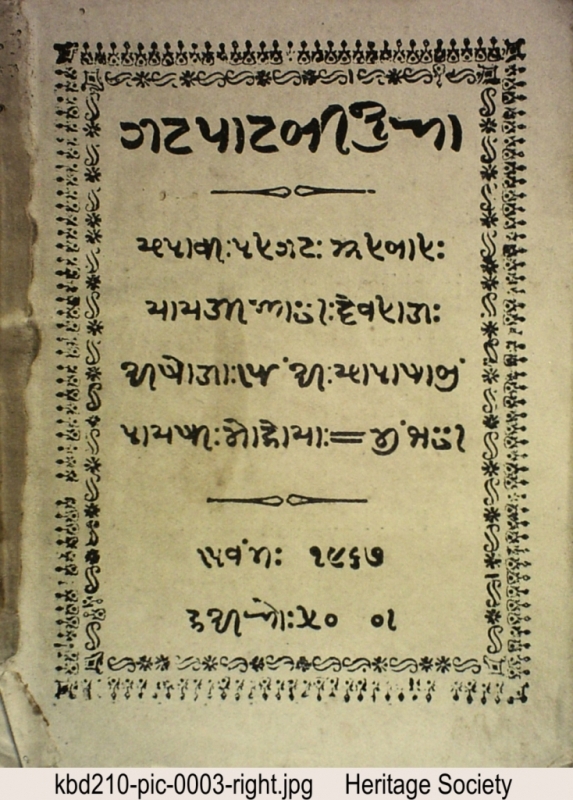
Asal Gat Pat ji Dua in Gujrati script By Mukhi Lalji bhai Devraj and Vali bhai Nanji in Mumbai in 1919 (Khoja Sindhi Printing Press)
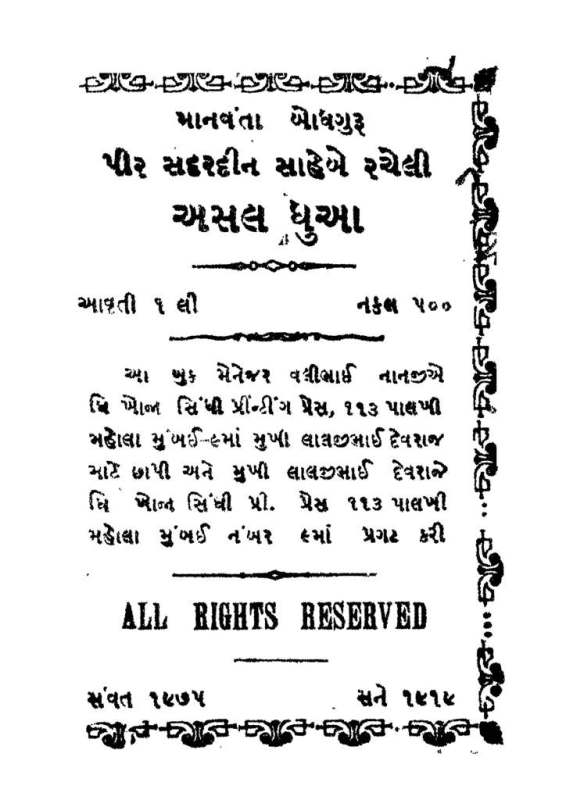
Asal Gat Pat ji Dua in Gujrati script By Mukhi Lalji bhai Devraj a 1922

Asal Gat Pat ji Dua in Gujrati script (8th edition) by The Recreation Club in Mumbai in 1938
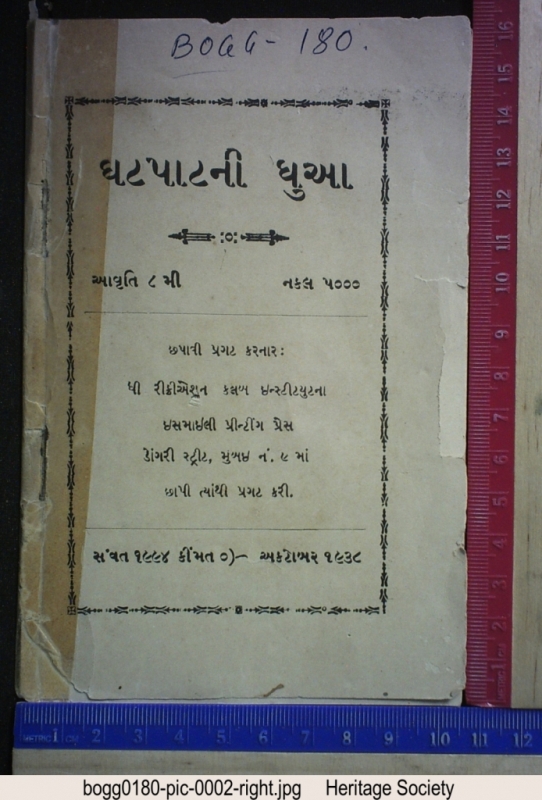
Asal Gat Pat ji Dua in Gujrati script by The Ismailia Association in Mumbai in 1945
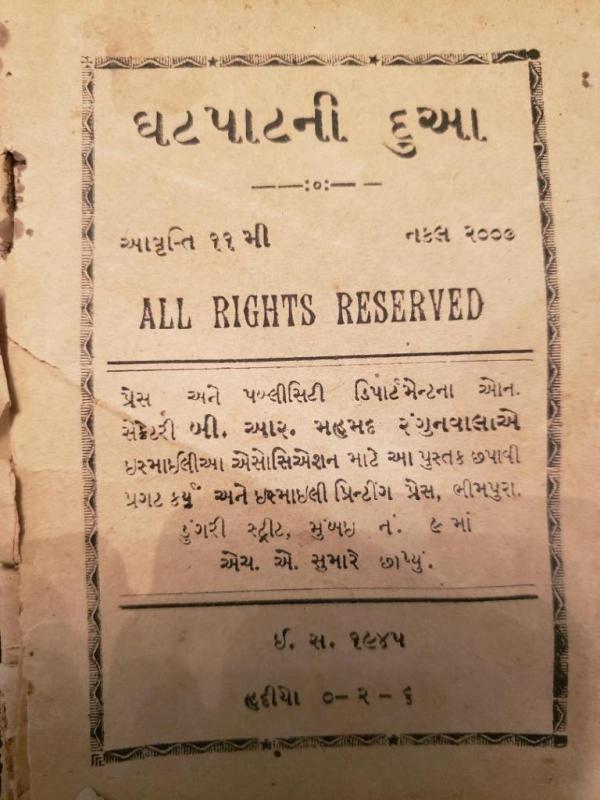
Asal Dua printed in Khojki script (no date, missing cover)

Asal Dua printed in Gujrati script in Mumbai in 1922 with meaning by Varteji missionary.

Asal Dua printed by The Recreation Club in Gujrati script in Mumbai in 1922 with meanings

Asal Dua printed by The Recreation Club Institute in Gujrati script in Mumbai in 1928

Asal Dua (10th edition, 5,000 copies printed) in Gujrati script in Mumbai in 1946

Here below are some cover pages of the Asal Gat Pat Dua
Asal Gat Pat ji Dua in Gujrati script in Mumbai in 1951 by The Ismailia Association

Asal Gat Pat ji Dua in Khojki script By Mukhi Lalji Bhai Devraj in Mumbai in 1911

Asal Gat Pat ji Dua in Gujrati script By Mukhi Lalji bhai Devraj and Vali bhai Nanji in Mumbai in 1919 (Khoja Sindhi Printing Press)

Asal Gat Pat ji Dua in Gujrati script By Mukhi Lalji bhai Devraj a 1922

Asal Gat Pat ji Dua in Gujrati script (8th edition) by The Recreation Club in Mumbai in 1938

Asal Gat Pat ji Dua in Gujrati script by The Ismailia Association in Mumbai in 1945

Last edited by Admin on Thu Dec 05, 2019 11:32 pm, edited 2 times in total.
-
swamidada_1
- Posts: 239
- Joined: Sun Nov 18, 2018 9:21 pm
Re: Asal Ghat Pat ji Dua - Pir Sadardin. AUDIO
I appreciate your recording of Ghat Paat ji Dua. It is our past heritage and history.Admin wrote:Here is the Asal Ghat Pat ji Dua attributed to Pir Sadardin.
Download AUDIO here - 27MB
http://ismaili.net/source/dua/ghatpaat-dua.m4a
I want to add my comments. This Ghat Paat Dus was continued till 1930/40. Interesting thing is that daily Dua which Ismailis recite before 1956 is completely included in that Ghat Paat Dua. A person who knows old Dua can realize it.
The recording starts with Allah tou Ahaar and at the end after duaniyyat khair the sentence is " SHAH JO NOOR SADAEIN BHARPUR, MADAD E ALI, SHAFAET E RASUL, ITA'AT E KHUDA ( OBEDIENCE OF ALLAH).
Re: Asal Ghat Pat ji Dua - Pir Sadardin. AUDIO
Gat Pat ji Dua continued till 1956 and later (at least 1960) in India. In fact there is a cover page of the 1951 - 14th edition from the Ismailia Association above.swamidada wrote: I appreciate your recording of Ghat Paat ji Dua. It is our past heritage and history.
I want to add my comments. This Ghat Paat Dus was continued till 1930/40.

Last edited by Admin on Mon Apr 05, 2021 12:10 am, edited 1 time in total.
-
swamidada_1
- Posts: 239
- Joined: Sun Nov 18, 2018 9:21 pm
Pakistan did not exist till 1947. After partition, there was fear and attempt to "pakistanise" our faith. The trend was also spread to Jamats under influence of Pakistan institutions.swamidada wrote:The cover you posted of booklet was published in Mumbai in 1951. May be they continued there for a while then discontinued. In Pakistan it was it discontinued in late 40's.
The Asal Dua and the Asal Gat Pat ji Dua were discontinued at the same time in 1956.
As we find more printed copies of Duas printed in different years and different countries, the date of the last edition will be clear. If anyone has copies of Dua book other than those of which the cover is given above, we will make them available here.
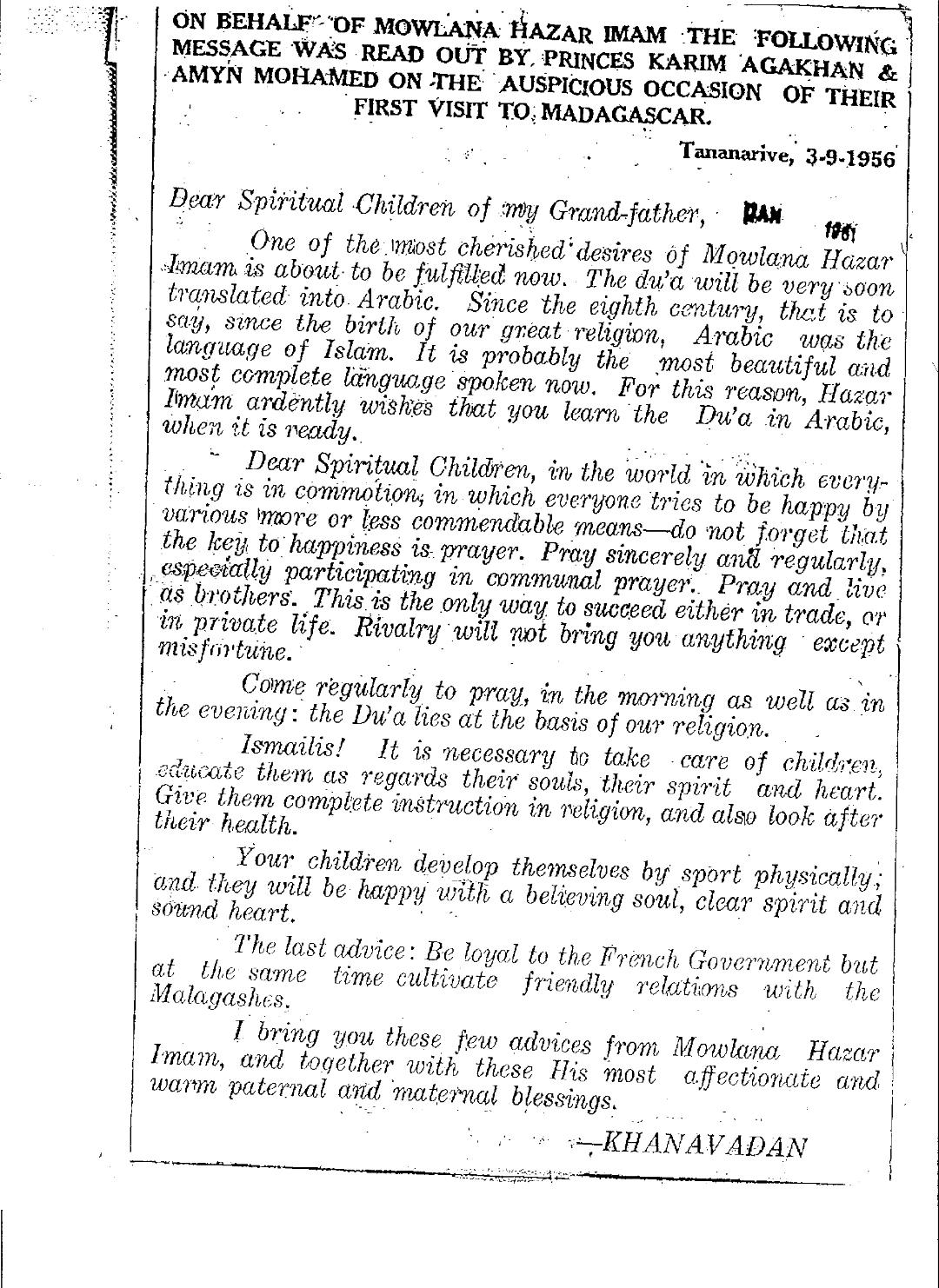
Last edited by Admin on Tue Jan 05, 2021 12:05 am, edited 2 times in total.
Ismaili Asal Dua 1820 (Aga Hassanali Shah, Aga Khan I)
From a Khojki Manuscript found in Mumbai and dated 1820. It was received from Massani Missionary in 1988 as a gift. Contains the Asal Dua as recited three years after Mowlana Hassanali Shah became Imam in Persia, long before his arrival in the Indian Subcontinent. Pages are neatly numbered, handwriting is legible but there are some minor water damage to the manuscript. There is use of red ink for separation and titles.
Here is one page that contains the end of the genealogy which is part of the Dua (prayer) - The expression "Vae kero purakh" near the last name of Imam Hassanali Shah signifies that he is the Imam of the Time (of that period) - Some other version of the Dua contains the expression "Hajar Jome jo Dhanri" which basically means the same.
This Dua was composed during the time of Pir Sadardin or maybe before, with name of present Imam added whenever there was the next Imam.
From a generalization of the Ismaili Heritage manuscripts catalogued so far, we can say that the presence of the Asal Dua or of the Gat Pat ji Dua is frequent, to the extent of at least one occurrence in every 7 manuscripts.
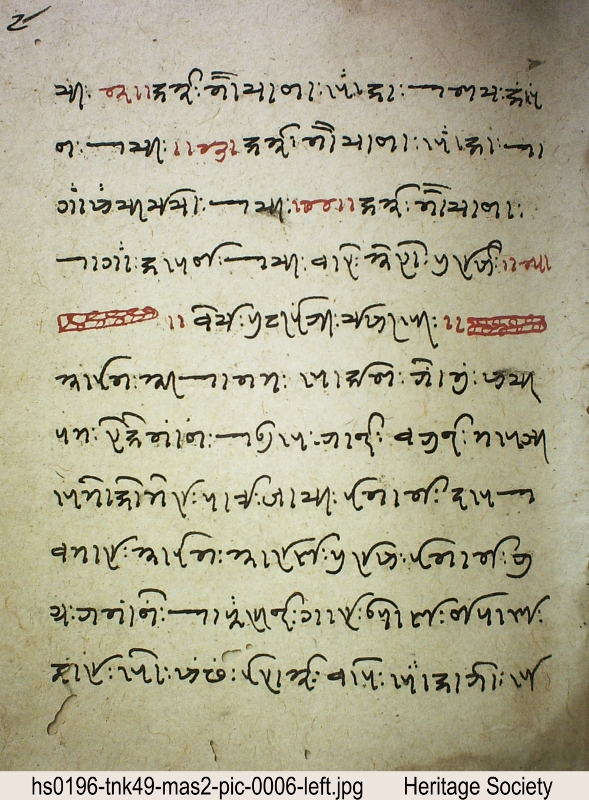
Here is one page that contains the end of the genealogy which is part of the Dua (prayer) - The expression "Vae kero purakh" near the last name of Imam Hassanali Shah signifies that he is the Imam of the Time (of that period) - Some other version of the Dua contains the expression "Hajar Jome jo Dhanri" which basically means the same.
This Dua was composed during the time of Pir Sadardin or maybe before, with name of present Imam added whenever there was the next Imam.
From a generalization of the Ismaili Heritage manuscripts catalogued so far, we can say that the presence of the Asal Dua or of the Gat Pat ji Dua is frequent, to the extent of at least one occurrence in every 7 manuscripts.

Last edited by Admin on Sun Jun 02, 2019 12:00 pm, edited 2 times in total.
1800s' Asal Gat Pat Dua (Aga Hassanali Shah, Aga Khan I) mss
Here is a page from an early 1800s' Khojki manuscript of 146 pages found in Kutch (India). It was part of the collection of some Dhalou Master. The manuscript also contains Chogadia and Jodila ginans (about 20).
In this particular page, the last 3 lines says:
Ya: Aga: Shah: Hassan: Ali: Allah: Haq: tun: Pak: tun: Dana: tun: Dina: tun: Awal: tun: Akhar: tun: ....
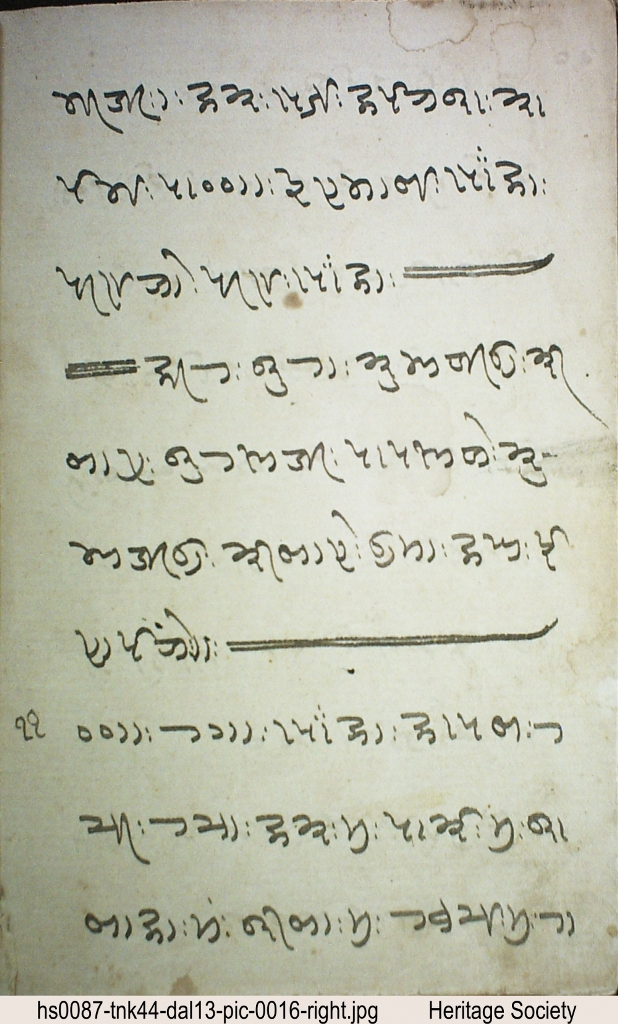
In this particular page, the last 3 lines says:
Ya: Aga: Shah: Hassan: Ali: Allah: Haq: tun: Pak: tun: Dana: tun: Dina: tun: Awal: tun: Akhar: tun: ....

Asal Dua Aga Hassanali Shah during Pir Aga Ali Shah
Another interesting Dua of three times (Dua Wakhat tre ji) from the time of Aga Hassanali Shah.
The list of Pirs contains as last names that of Pir Sarkar Mata Salamat followed by the name of Aga Ali Shah as Pir of the Time..
This Khojki manuscript was received in 1991 from al-Waez Babul Missionary. The title page is the words Tran Wakhat ji Dua" inside a beautiful flower parallel patterns that we find sometimes in Khojki manuscript who otherwise are very sober..
I have attached the first page and the ending of list of Pir with the Kalma which is quite interesting in its formulation. At the end of the Dua, it says "Dossani bhai Alladin Ghulamhussein ja Salam"
The second image contains also the Pak Kalma. "Kalmo pak ashahadun la ellah ellalah mahmad rasullilah, ali amirul momanin ali sahi allah gur gat ke haijanda kayampaya, Allah jo Didar, ....
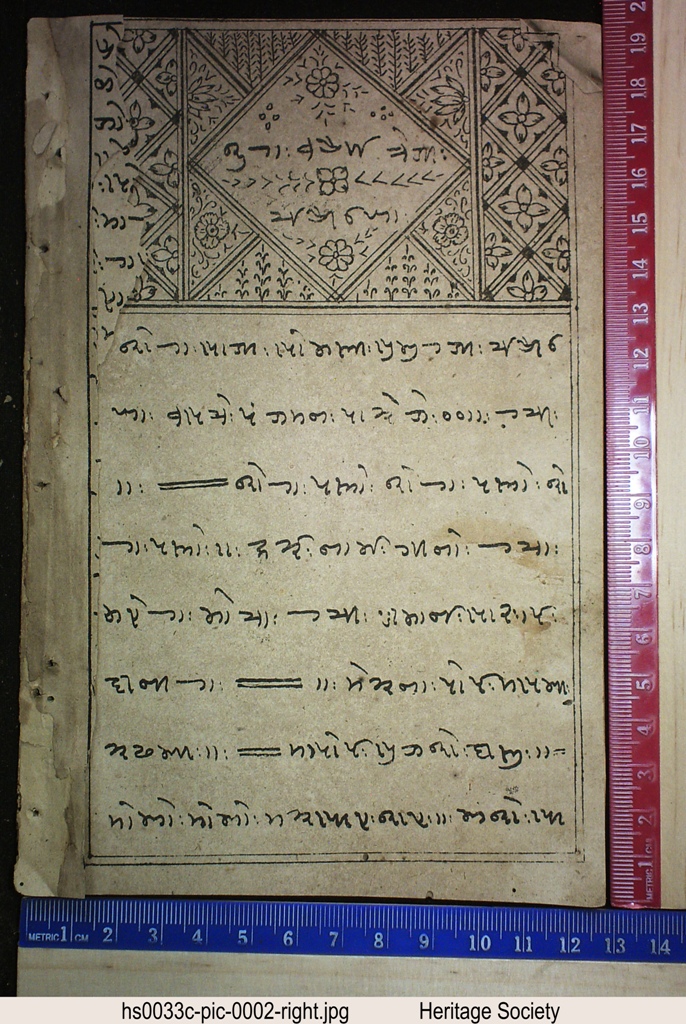
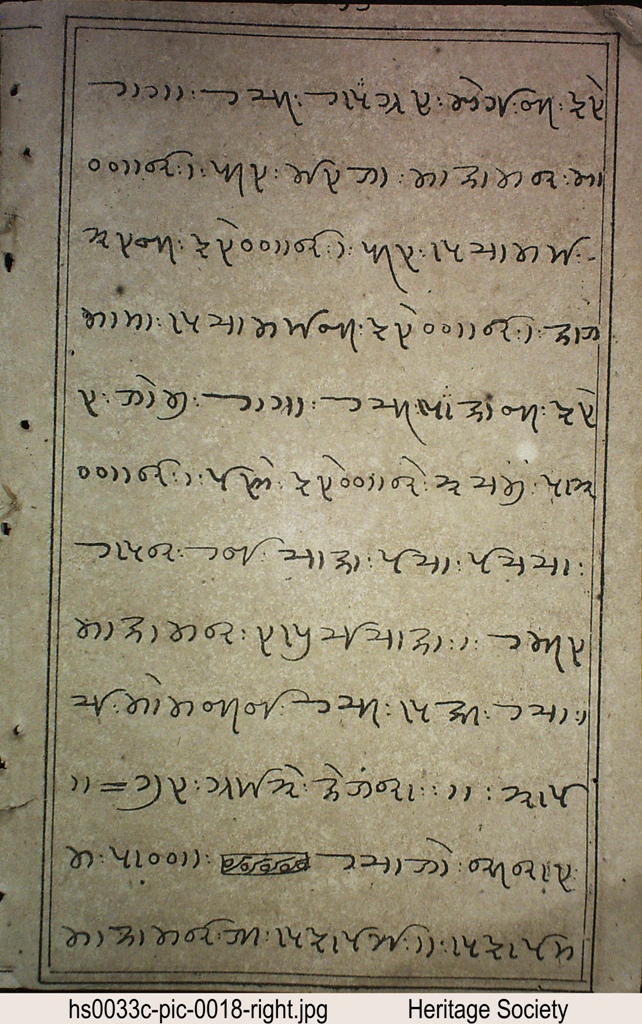
The list of Pirs contains as last names that of Pir Sarkar Mata Salamat followed by the name of Aga Ali Shah as Pir of the Time..
This Khojki manuscript was received in 1991 from al-Waez Babul Missionary. The title page is the words Tran Wakhat ji Dua" inside a beautiful flower parallel patterns that we find sometimes in Khojki manuscript who otherwise are very sober..
I have attached the first page and the ending of list of Pir with the Kalma which is quite interesting in its formulation. At the end of the Dua, it says "Dossani bhai Alladin Ghulamhussein ja Salam"
The second image contains also the Pak Kalma. "Kalmo pak ashahadun la ellah ellalah mahmad rasullilah, ali amirul momanin ali sahi allah gur gat ke haijanda kayampaya, Allah jo Didar, ....


-
Important_Information
- Posts: 60
- Joined: Tue Nov 06, 2007 8:17 am
Asal Dua
Dear Admin,
I was listening today the audio of old Dua that on
ismaili.net site and I noticed that, several words that was pronounce
incorrectly and several words which was missed out and many of them said
incorrectly so the meaning could be different and changed of many words.
I was also shocked to see that and was wondering if we are allowed to declare
that we were reciting those Dua in old age? I was always thinking that it is
completely confidential and should be kept secret for our self as it is for those
secret believers only.
I also got the old GatPat Dua book and I know this Dua by heart
since my childhood and been reciting it every week by myself so I don't forget
it.
If you wish I can point out those mistakes in that audio recording.
And I can post both of the old Dua in PDF format.
I'm originally pure Gujarati and it is difficult for me to
write in English so I'm very slow in writing and there could be many mistakes
up here in my English so please ignore them.
I was listening today the audio of old Dua that on
ismaili.net site and I noticed that, several words that was pronounce
incorrectly and several words which was missed out and many of them said
incorrectly so the meaning could be different and changed of many words.
I was also shocked to see that and was wondering if we are allowed to declare
that we were reciting those Dua in old age? I was always thinking that it is
completely confidential and should be kept secret for our self as it is for those
secret believers only.
I also got the old GatPat Dua book and I know this Dua by heart
since my childhood and been reciting it every week by myself so I don't forget
it.
If you wish I can point out those mistakes in that audio recording.
And I can post both of the old Dua in PDF format.
I'm originally pure Gujarati and it is difficult for me to
write in English so I'm very slow in writing and there could be many mistakes
up here in my English so please ignore them.
You can send me the pdf on [email protected]
Please recite both Dua (Asal Dua and Asal Ghat Pat ji Dua) and send as audio attachment with email. make sure the attachments are not bigger than 16Meg each.
We can not change history, all these documents are in the public since decades if not centuries, even handwritten affidavit of Mowlana Sultan Muhammad Shah mentioning Das Avatar to the British Court.
Thank you so much!
Mowla tamane sukhi ne abad kare.
Please recite both Dua (Asal Dua and Asal Ghat Pat ji Dua) and send as audio attachment with email. make sure the attachments are not bigger than 16Meg each.
We can not change history, all these documents are in the public since decades if not centuries, even handwritten affidavit of Mowlana Sultan Muhammad Shah mentioning Das Avatar to the British Court.
Thank you so much!
Mowla tamane sukhi ne abad kare.
-
Important_Information
- Posts: 60
- Joined: Tue Nov 06, 2007 8:17 am
Tell him we value his contribution and he is a living legend as there are probably no other person left in this world who knows by heart the Asal Gat Pat ji Dua recited from that time.... We pray for his long healthy life.Important_Information wrote: The above post was from my Father, he used my account for this post.
My mother is 92 and she used also to recite it regularly but she barely remembers now some passages of that Dua and can only recite it entirely with the help of a Gujrati or Khojki book.
Ismaili Dua 1956 Pakistan
There was a question that in Pakistan the new Dua with chapters ending in Lizi Krihi Sujud may have never been recited and they started from beginning to recite Allah Huma Laka Sujudi Wataati.
In fact when the New Dua was promulgated in 1956, the Ismailia Association for Pakistan prepared for publishing or for printing 10,000 copies of a booklet of Dua for Ismailia Association in Africa. The books were printed at Aage Kadam Printery in Karachi in South Napier Road.
Indeed the 1956 Pakistan version has Lizikrihi sujud. It will be valuable therefore to find out if that book was recited in Pakistan or only prepared /printed there for Africa and also what year is the first edition which has Wa Taati in it (maybe 1957?) printed in Pakistan.
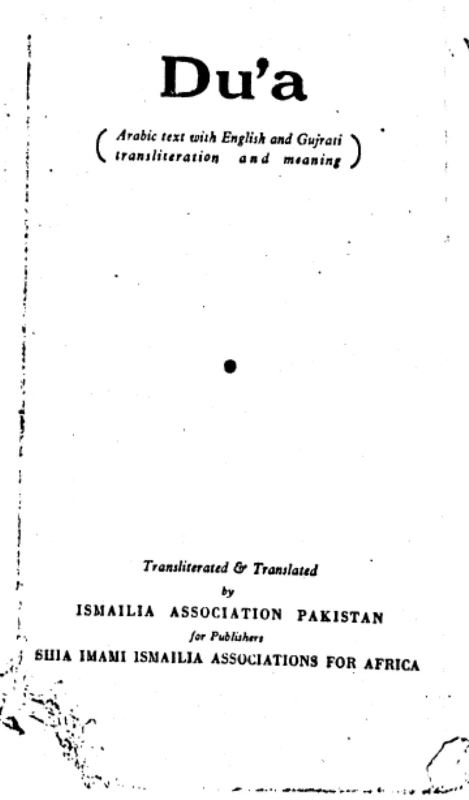
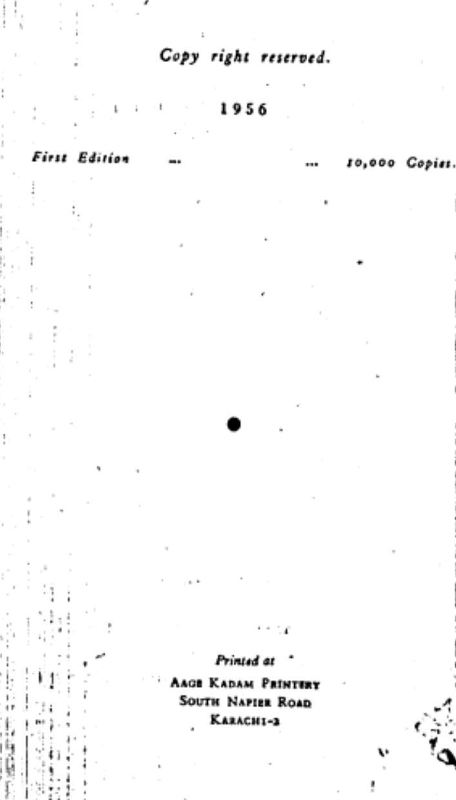
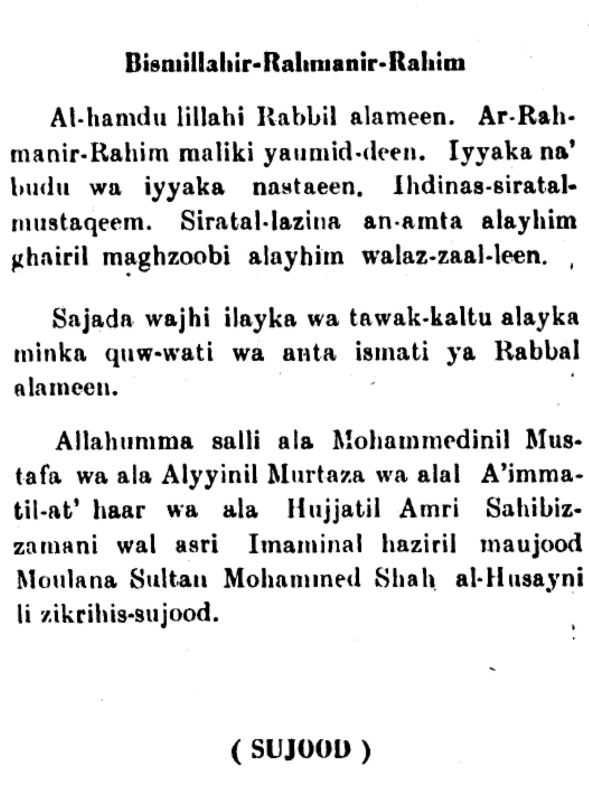
In fact when the New Dua was promulgated in 1956, the Ismailia Association for Pakistan prepared for publishing or for printing 10,000 copies of a booklet of Dua for Ismailia Association in Africa. The books were printed at Aage Kadam Printery in Karachi in South Napier Road.
Indeed the 1956 Pakistan version has Lizikrihi sujud. It will be valuable therefore to find out if that book was recited in Pakistan or only prepared /printed there for Africa and also what year is the first edition which has Wa Taati in it (maybe 1957?) printed in Pakistan.



Last edited by Admin on Wed Oct 21, 2020 10:00 pm, edited 1 time in total.
Changes in Dua from 1956 to 1970 in Africa
Considering that the Dua was recited by Ismaili Jamats in Africa and Syria at least up to 1968 with chapters ending with Lizikrihi Sujud, this one published for Navroz 21st March 1970 by Ismailia Association for Africa in Nairobi may be the first publication for Africa with the Dua ending with Wa Ta'ati.
If you have any earlier Dua for Africa Jamat ending with "Wa Ta'ati" in 1969 (if it exists) , we would be glad to post a copy of some pages in this section.
You will notice the note that says that this book replicates the Dua from Pakistan.
Here is the cover page with a couple of other pages.
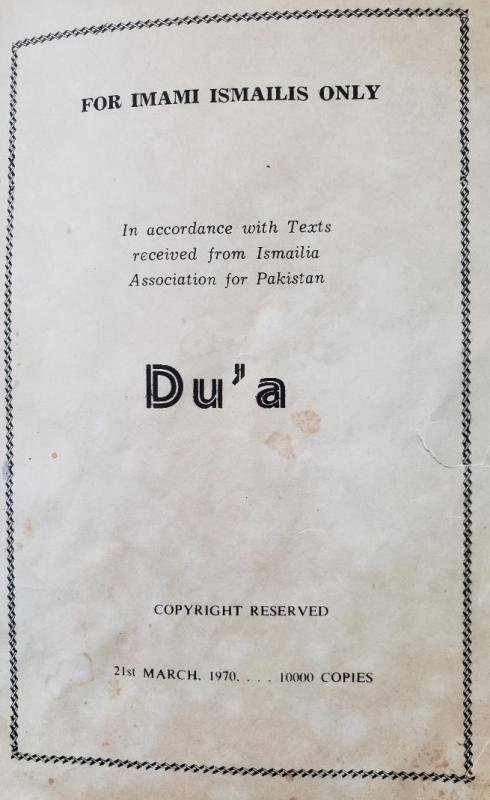
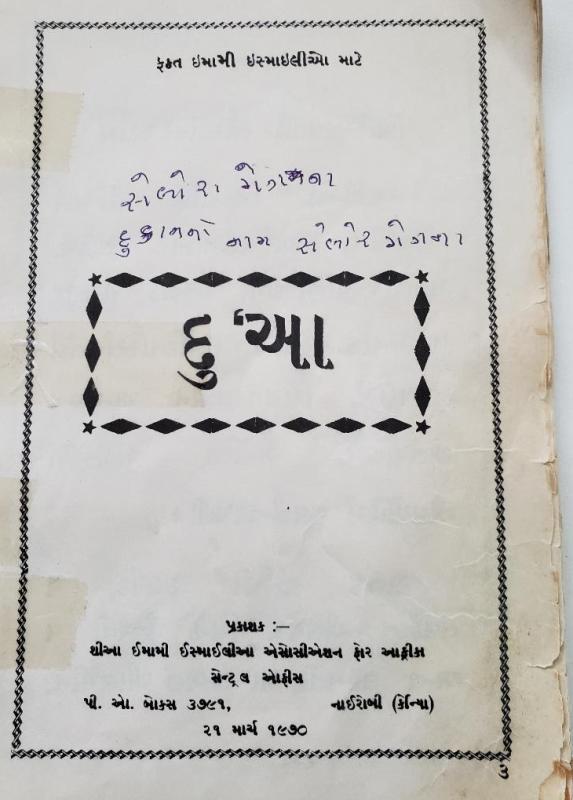
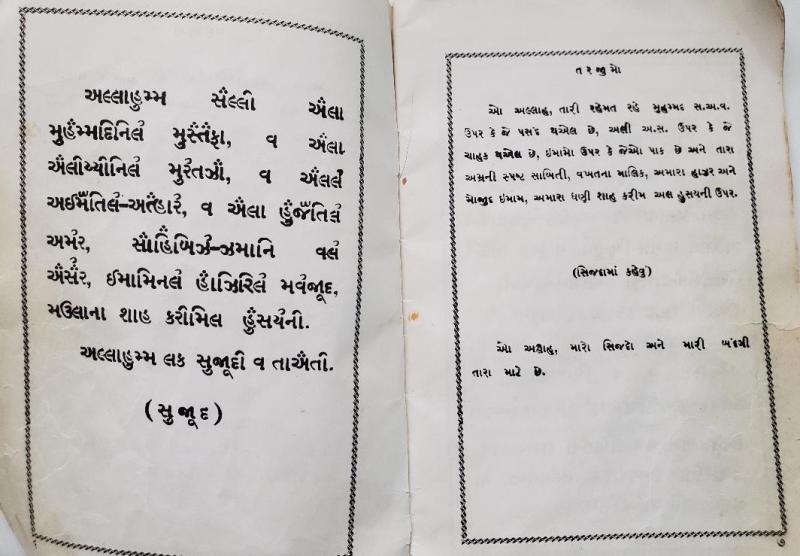
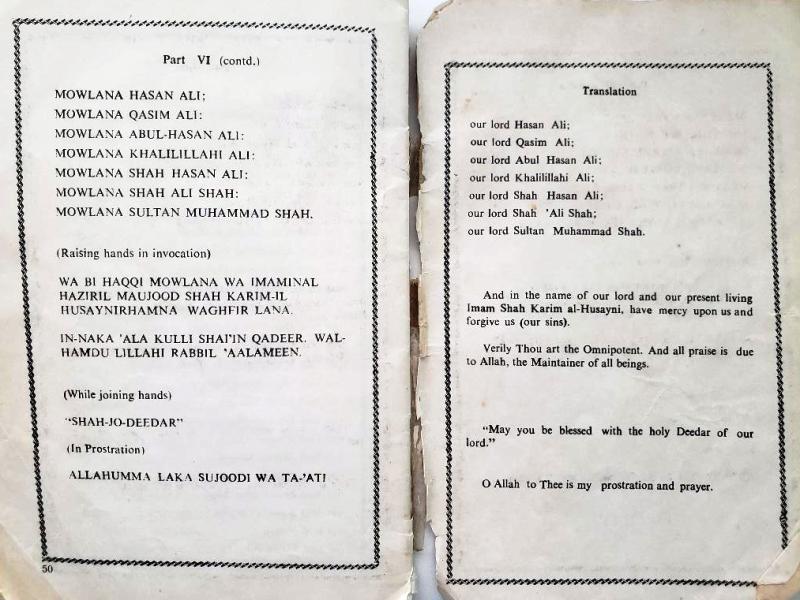
Considering that the Dua was recited by Ismaili Jamats in Africa and Syria at least up to 1968 with chapters ending with Lizikrihi Sujud, this one published for Navroz 21st March 1970 by Ismailia Association for Africa in Nairobi may be the first publication for Africa with the Dua ending with Wa Ta'ati.
If you have any earlier Dua for Africa Jamat ending with "Wa Ta'ati" in 1969 (if it exists) , we would be glad to post a copy of some pages in this section.
You will notice the note that says that this book replicates the Dua from Pakistan.
Here is the cover page with a couple of other pages.




-
swamidada_2
- Posts: 297
- Joined: Mon Aug 19, 2019 8:18 pm
THE LITERAL MEANING OF NAMES OF AHL E BAIT & ISMAILI IMAMS & THEIR TITLES
Ahl e Bait:
Muhammad means highly praised, commended, admired.
Mustafa means chosen, selected.
Ali means most high, exalted, noble.
Murtadha means favored, esteemed.
Fatimah means a woman who has weaned a child at the fixed time.
Zahra means radiant, brilliant, splendid, bright.
Hasan means handsome, beautiful
Hussain means lovable, handsome.
Meaning of names of Imams and titles:
1. Ali - most high, exalted, noble
2. Hussain - lovable, handsome
3. Zainul Aabidin (real name Ali) - adornment of the worshipers
4. Muhammad al Baqir (real name Muhammad) - Baqir means abundant in knowledge
5. Ja'far as Sadiq (real name Ja'far) means river, stream and Sadiq means truthful
6. Isma'el (this is a Hebrew word) means listening by God (shima means to listen and el means God)
7. Muhammad bin Isma'el - Muhammad means highly praised, admired. Bin means son, Isma'el means listening by God
8. Wafi Ahmad (real name Abdullah) - Wafi means faithful, perfect, trustworthy and Ahmad means highly praised, exolted
9. Taqi Muhammad (real name Ahmad) - Taqi means God fearing, pious and Muhammad means highly praised
10. Radhi Abdullah (real name Hussain) - Radhi means contentment and pleasure of Allah, Abdullah means servant of Allah
11. Muhammad al Mahdi (real name Abdulla) - Muhammad means highly praised, Mahdi means guided one
12. Qaim bi Amri'llah (real name Muhammad Nizar) - means one who by the command of Allah, has stood for the work religious work
13. Mansur bi'llah (real name Ismael) means the one who has received help from Allah
14. Mu'iz li dini'llah (real name Ma'ad) - means the one who gives strenght and honor to the din (religion) of Allah
15. Aziz bi'llah (real name Nizar) - means the one whom Allah has given respect, honor, might
16. Hakim bi amri'llah (real name Mansoor) - means one who judges and decides according to comman of Allah
17. Zahir (real name Ali) - means apparent, helper,overpowering
18. Mustansir bi'llah (real name Ma'ad) - means one who seeks help from Allah
19. Nizar (Al Mustafa li dini'llah) Nizar means weak, humble,
20. Hadi - guide, leader
21. Muhatadi (real name Muhammad) - means one who finds the right path, rightly guided
22. Qahir (bi quwwati'llah) Qahir means - means overpowering, mighty
23. Ala Zikrihi's salam (real name Hasan) - ala zikrihi's salam means peace upon his rememberance
24. A'la Muhammad (real name Muhammad) - means highest, the most exalted and Muhammad means highly praised
25. Jalalu'd din Hasan (real name Hasan) real name was Hasan, Jalalu'd din means the greatness and grandeur of religion
26. Ala'ud din Muhammad (real name Muhammad) means exaltedness and nobility of religion and Muhammad meand highly praised
27. Ruknu'd din Khurshsh - Rukn means pillar, support. Ruknu'd din means the one on whom religion depends. Khur means sun and shah means the king
28. Shamsu'd din Muhammad (real name Muhammad) shams means sun and shamsu'd din means the sun of din and Muhammad means highly praised
29. Qasim Shah - Qasim means divider, distributor (of wisdom and knowledge)
30. Islam Shah (real name Sayyed Ahmad) - means king of peace
31. Muhammad bin Islam Shah - Muhammad means highly praised, bin means son, and Islam Shah means king of peace
32. Mustansir bi'llah (real name Ali Shah) - means one who seeks help from Allah
33. Abdu's salam (also known as Mahmud Shah) - abd means servant, slave, salam means peace,security
34. Gharib Mirza (real name Abbas Shah) - gharib means poor, foreign,extraordinary. Mirza means prince
35. Abu Dharr ali (real name Muhammad) - abu means father, dharr means particle. Abu Dharr Ali means Ali who is father of particles
36. Murad Mirza (also known as Ali Shah) murad means desired, sought, intended. Mirza means prince
37. Zulfiqar Ali - zu means possessor, owner. Faqar means vertebra, backbone. Zulfiqar means the sword whose back is like the backbone.
38. Noorudin Ali - Noor means the light of din. Ali is noor (light ) of din
39. Khalilu'llah Ali - khalil means friend, Khalilu'llah means friend of Allah
40. Nizar - means weak, humble
41. Sayyed Ali - Sayyed means leader, chief, progeny of Ali and Fatimah
42. Hasan Ali (also known as Baqir Shah) Hasan means handsome, beautiful
43. Qasim Ali (also known as Ja'far Shah) Qasim means divider, distributor
44. Abu'l Hasan Ali (also known as Hasan Baig and Muhammad Hasan Shah) Abu means father
45. Khalilu'llh Ali - means friend of Allah
46. Hasan Ali Shah - Hasan means handsome, beautiful
47. Ali Shah - means Ali is the king
48. Sultan Muhammad Shah - Sultan means king, force, overpowering, powerful
49. Shah Karim - Karim means generous, honorable, esteemed. Shah Karim means generous and honorable king
Ahl e Bait:
Muhammad means highly praised, commended, admired.
Mustafa means chosen, selected.
Ali means most high, exalted, noble.
Murtadha means favored, esteemed.
Fatimah means a woman who has weaned a child at the fixed time.
Zahra means radiant, brilliant, splendid, bright.
Hasan means handsome, beautiful
Hussain means lovable, handsome.
Meaning of names of Imams and titles:
1. Ali - most high, exalted, noble
2. Hussain - lovable, handsome
3. Zainul Aabidin (real name Ali) - adornment of the worshipers
4. Muhammad al Baqir (real name Muhammad) - Baqir means abundant in knowledge
5. Ja'far as Sadiq (real name Ja'far) means river, stream and Sadiq means truthful
6. Isma'el (this is a Hebrew word) means listening by God (shima means to listen and el means God)
7. Muhammad bin Isma'el - Muhammad means highly praised, admired. Bin means son, Isma'el means listening by God
8. Wafi Ahmad (real name Abdullah) - Wafi means faithful, perfect, trustworthy and Ahmad means highly praised, exolted
9. Taqi Muhammad (real name Ahmad) - Taqi means God fearing, pious and Muhammad means highly praised
10. Radhi Abdullah (real name Hussain) - Radhi means contentment and pleasure of Allah, Abdullah means servant of Allah
11. Muhammad al Mahdi (real name Abdulla) - Muhammad means highly praised, Mahdi means guided one
12. Qaim bi Amri'llah (real name Muhammad Nizar) - means one who by the command of Allah, has stood for the work religious work
13. Mansur bi'llah (real name Ismael) means the one who has received help from Allah
14. Mu'iz li dini'llah (real name Ma'ad) - means the one who gives strenght and honor to the din (religion) of Allah
15. Aziz bi'llah (real name Nizar) - means the one whom Allah has given respect, honor, might
16. Hakim bi amri'llah (real name Mansoor) - means one who judges and decides according to comman of Allah
17. Zahir (real name Ali) - means apparent, helper,overpowering
18. Mustansir bi'llah (real name Ma'ad) - means one who seeks help from Allah
19. Nizar (Al Mustafa li dini'llah) Nizar means weak, humble,
20. Hadi - guide, leader
21. Muhatadi (real name Muhammad) - means one who finds the right path, rightly guided
22. Qahir (bi quwwati'llah) Qahir means - means overpowering, mighty
23. Ala Zikrihi's salam (real name Hasan) - ala zikrihi's salam means peace upon his rememberance
24. A'la Muhammad (real name Muhammad) - means highest, the most exalted and Muhammad means highly praised
25. Jalalu'd din Hasan (real name Hasan) real name was Hasan, Jalalu'd din means the greatness and grandeur of religion
26. Ala'ud din Muhammad (real name Muhammad) means exaltedness and nobility of religion and Muhammad meand highly praised
27. Ruknu'd din Khurshsh - Rukn means pillar, support. Ruknu'd din means the one on whom religion depends. Khur means sun and shah means the king
28. Shamsu'd din Muhammad (real name Muhammad) shams means sun and shamsu'd din means the sun of din and Muhammad means highly praised
29. Qasim Shah - Qasim means divider, distributor (of wisdom and knowledge)
30. Islam Shah (real name Sayyed Ahmad) - means king of peace
31. Muhammad bin Islam Shah - Muhammad means highly praised, bin means son, and Islam Shah means king of peace
32. Mustansir bi'llah (real name Ali Shah) - means one who seeks help from Allah
33. Abdu's salam (also known as Mahmud Shah) - abd means servant, slave, salam means peace,security
34. Gharib Mirza (real name Abbas Shah) - gharib means poor, foreign,extraordinary. Mirza means prince
35. Abu Dharr ali (real name Muhammad) - abu means father, dharr means particle. Abu Dharr Ali means Ali who is father of particles
36. Murad Mirza (also known as Ali Shah) murad means desired, sought, intended. Mirza means prince
37. Zulfiqar Ali - zu means possessor, owner. Faqar means vertebra, backbone. Zulfiqar means the sword whose back is like the backbone.
38. Noorudin Ali - Noor means the light of din. Ali is noor (light ) of din
39. Khalilu'llah Ali - khalil means friend, Khalilu'llah means friend of Allah
40. Nizar - means weak, humble
41. Sayyed Ali - Sayyed means leader, chief, progeny of Ali and Fatimah
42. Hasan Ali (also known as Baqir Shah) Hasan means handsome, beautiful
43. Qasim Ali (also known as Ja'far Shah) Qasim means divider, distributor
44. Abu'l Hasan Ali (also known as Hasan Baig and Muhammad Hasan Shah) Abu means father
45. Khalilu'llh Ali - means friend of Allah
46. Hasan Ali Shah - Hasan means handsome, beautiful
47. Ali Shah - means Ali is the king
48. Sultan Muhammad Shah - Sultan means king, force, overpowering, powerful
49. Shah Karim - Karim means generous, honorable, esteemed. Shah Karim means generous and honorable king
In old manuscripts, the 40th Imam name is Nizarali
What is amazing is that I have heard many people recite Mowlana Nizarali though the name in the recent books is Nizar. Also there is a manuscript where it says Hajar Jome jo Dhanri (present Imam) Imam Chalismo I guess we have to verify in that one if it is Nizar or Nizarali
Though I have mentioned it previously, it is important to keep this information on record, even if repeated.
What is amazing is that I have heard many people recite Mowlana Nizarali though the name in the recent books is Nizar. Also there is a manuscript where it says Hajar Jome jo Dhanri (present Imam) Imam Chalismo I guess we have to verify in that one if it is Nizar or Nizarali
Though I have mentioned it previously, it is important to keep this information on record, even if repeated.
-
swamidada_2
- Posts: 297
- Joined: Mon Aug 19, 2019 8:18 pm
Admin
Joined: 06 Jan 2003
Posts: 5959
PostPosted: 23 Dec 2019 05:42 pm Post subject: Reply with quote
There is no partner with God, there is only one God and this is exactely what Ismaili says when they say Ali Sahi Allah.
In 1964, during Ismailia Association presidents meeting. Rai Shamsuddin Tejpar of Tanganika (Tanzania) association asked Hazar Imam about meaning of ALIYULLAH IN SECOND PART OF DUA. Imam replied it means " ALI IS FROM ALLAH".
Joined: 06 Jan 2003
Posts: 5959
PostPosted: 23 Dec 2019 05:42 pm Post subject: Reply with quote
There is no partner with God, there is only one God and this is exactely what Ismaili says when they say Ali Sahi Allah.
In 1964, during Ismailia Association presidents meeting. Rai Shamsuddin Tejpar of Tanganika (Tanzania) association asked Hazar Imam about meaning of ALIYULLAH IN SECOND PART OF DUA. Imam replied it means " ALI IS FROM ALLAH".
If the Imam gave this meaning, it must be for zaheri reasons such publications etc.swamidada wrote: In 1964, during Ismailia Association presidents meeting. Rai Shamsuddin Tejpar of Tanganika (Tanzania) association asked Hazar Imam about meaning of ALIYULLAH IN SECOND PART OF DUA. Imam replied it means " ALI IS FROM ALLAH".
But from a Batini perspective Aliyullah means Ali Sahi Allah. Otherwise it does not even make sense to say it. Aren't we all from Allah? Then what is so special of Ali being from Allah?
Lets not restart this discussion on Ali Sahi Allah which has already been shown a zillion times appropriately with credible references of Farmans of vaious Imam. There is a thread on this matter and I suggest to re-read its content before posting in the appropriate thread any new information
No more repetition allowed. Repetition will be deleted.
No more repetition allowed. Repetition will be deleted.
Re: Ismaili Dua 1956 Pakistan
See this link for complete post: http://www.ismaili.net/html/modules.php ... 7271#67271Admin wrote:There was a question that in Pakistan the new Dua with chapters ending in Lizi Krihi Sujud may have never been recited and they started from beginning to recite Allah Huma Laka Sujudi Wataati.
In fact when the New Dua was promulgated in 1956, the Ismailia Association for Pakistan prepared for publishing or for printing 10,000 copies of a booklet of Dua for Ismailia Association in Africa. The books were printed at Aage Kadam Printery in Karachi in South Napier Road.
Indeed the 1956 Pakistan version has Lizikrihi sujud. It will be valuable therefore to find out if that book was recited in Pakistan or only prepared /printed there for Africa and also what year is the first edition which has Wa Taati in it (maybe 1957?) printed in Pakistan.
Further to my above posting, I found that previous to 1961, there were cyclostyled copies of the Dua were distributed to every Religious Night Schools in Pakistan for the use of the teachers (of which I could not find any copies, please send us if you find)
So here are a couple of pages of the earlier editions of the Dua with "laka sujudu wa ta'ti" printed in Pakistan in early 1960s' - the 1961 edition being printed at Aage Kadam Printery, same printing press as the 1956 edition with "Lizi krihi Sujud)
1. 1st edition in 1961 (English) Du’a (Aage Kadam Printery, Karachi)
http://ismaili.net/source/dua/1961-eng- ... -book1.pdf
2. 1st edition in 1961 (Urdu) Du’a (Abbasi Press, Karachi)
http://ismaili.net/source/dua/1961-urdu ... -book3.pdf
3. 2nd edition in 1962 (English) Du’a (Name of printer not given)
http://ismaili.net/source/dua/1962-eng- ... -book2.pdf
4. 1st edition in 1964 (English) Glossary of Du’a (Capital Printing House)
http://ismaili.net/source/dua/1964-eng- ... -book6.pdf
5. 1st edition in 1964 (English/Urdu in Roman English) Du’a & Translation (Zeenat Printing Works, Dacca, East Pakistan)
http://ismaili.net/source/dua/eng-pak-d ... -book4.pdf
6. 5th edition in 1978 (English/Urdu in Roman English) Transliteration & Translation (Abbasi Litho Art Press)
http://ismaili.net/source/dua/1979-eng- ... -book5.pdf
As Received, a reply to the question on which Dua was recited from 1956 to 1960 in Pakistan
Itmadi Fakir Muhammad (B.com., LLB and CA) is a learned person in Karachi. He is now 82 years age. He was also the Joint Kamadia of Darkhana Jamatkhana and even was a religious teacher. When asked, he told me today that between 1956 and 1960, the old dua was recited with following addition during prostration:-
"Maulana Sultan Muhammad Shah al Hussayni lizikri hi sujud."
Please note it.
Itmadi Fakir Muhammad (B.com., LLB and CA) is a learned person in Karachi. He is now 82 years age. He was also the Joint Kamadia of Darkhana Jamatkhana and even was a religious teacher. When asked, he told me today that between 1956 and 1960, the old dua was recited with following addition during prostration:-
"Maulana Sultan Muhammad Shah al Hussayni lizikri hi sujud."
Please note it.